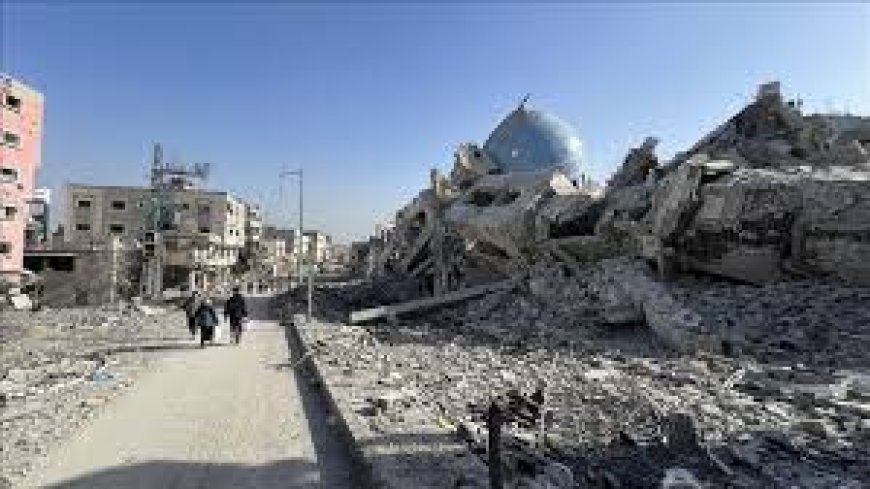Humanitarian Efforts in Gaza: A Comprehensive Overview
bcnewsone.com, breaking news, bcnewsone,bcnews

Humanitarian Efforts in Gaza: A Comprehensive Overview
Introduction
The Gaza Strip has been enduring a prolonged humanitarian crisis exacerbated by ongoing conflict and political instability. In response to this dire situation, global humanitarian organizations have mobilized to provide crucial support to the affected population. This article provides an in-depth examination of the efforts of major humanitarian organizations, focusing on the contributions of Human Initiative and similar entities, to alleviate the suffering of Palestinians in Gaza.
1. Overview of the Gaza Crisis
1.1 Historical Context The Gaza Strip, a small and densely populated area, has been a focal point of the Israeli-Palestinian conflict for decades. The blockade imposed by Israel and Egypt, coupled with periodic escalations in violence, has severely impacted Gaza's infrastructure and economy. This has led to widespread poverty, unemployment, and a fragile healthcare system. Understanding this historical backdrop is crucial for comprehending the current humanitarian crisis.
1.2 Current Situation The recent escalations in Gaza have intensified the humanitarian crisis. Regular airstrikes and ground operations have led to significant destruction of infrastructure, including hospitals, schools, and homes. The blockade has severely restricted the movement of goods and people, exacerbating shortages of essential supplies. The civilian population faces immense challenges, including limited access to healthcare, clean water, and basic necessities.
2. Major Humanitarian Organizations in Gaza
2.1 Human Initiative
-
Mission and Goals Human Initiative is a global humanitarian organization dedicated to providing aid in crisis situations. Their mission in Gaza focuses on delivering essential medical assistance, food, and other forms of support to those in need. Their goals include alleviating immediate suffering, supporting displaced populations, and enhancing the overall well-being of affected communities.
-
Key Activities Human Initiative’s efforts in Gaza encompass a range of critical activities:
- Medical Assistance: Establishing field hospitals and clinics to provide emergency medical care, including surgeries, trauma care, and treatment for chronic conditions.
- Medical Supplies: Distributing essential medical supplies, such as medications, surgical instruments, and diagnostic tools, to hospitals and clinics.
- Food Aid: Providing food packages and nutritional support to families affected by the crisis.
- Shelter and Protection: Offering temporary shelter solutions for displaced families and individuals, along with protection services for vulnerable groups.
-
Impact Assessment Human Initiative’s interventions have had a profound impact on the ground. Their medical assistance has helped save countless lives and improve the quality of care available to those injured or suffering from illness. The distribution of food and other essentials has eased the immediate burden on families, while their shelter initiatives have provided much-needed relief to those displaced by the conflict.
2.2 Other Key Organizations
-
International Committee of the Red Cross (ICRC)
- Role and Mission: The ICRC operates globally to provide humanitarian aid and uphold international humanitarian law. In Gaza, their efforts include offering emergency medical care, distributing food and water, and facilitating access to clean water and sanitation facilities.
- Key Activities: The ICRC has been actively involved in repairing and maintaining critical infrastructure, such as hospitals and water treatment plants, to ensure continued service delivery during the crisis.
-
Doctors Without Borders (MSF)
- Mission: MSF is known for its medical humanitarian work in conflict zones. In Gaza, MSF provides emergency medical care, including surgeries, and supports mental health services for trauma survivors.
- Key Activities: MSF operates mobile clinics and field hospitals to reach the most affected areas, offering life-saving medical care and psychological support to those in need.
-
UN Relief and Works Agency (UNRWA)
- Role and Mission: UNRWA is dedicated to supporting Palestinian refugees across the Middle East. In Gaza, their mission includes providing food aid, shelter, education, and healthcare services.
- Key Activities: UNRWA manages a network of schools and health centers, and coordinates the distribution of food and emergency supplies to displaced and vulnerable populations.
3. Types of Aid Provided
3.1 Medical Assistance
-
Emergency Medical Services The provision of emergency medical services is critical in a crisis. Human Initiative and other organizations set up field hospitals and mobile clinics to offer immediate care for injuries and medical emergencies. This includes trauma care for those injured in conflict-related incidents, as well as treatment for chronic conditions exacerbated by the crisis.
-
Medical Supplies The delivery of medical supplies is essential for maintaining the functionality of healthcare facilities. This involves the distribution of medications, surgical tools, diagnostic equipment, and other necessary items to hospitals and clinics in Gaza. Ensuring a steady supply of these resources is vital for effective medical response.
3.2 Food and Water
-
Food Distribution Providing food aid helps to address the immediate nutritional needs of affected families. Organizations distribute food packages containing staples such as rice, flour, and canned goods, along with nutritional supplements for vulnerable groups like children and the elderly.
-
Clean Water Supply Access to clean water is a major concern in conflict zones. Human Initiative and other groups work to provide safe drinking water and improve sanitation facilities. This includes repairing and maintaining water infrastructure and distributing water purification tablets.
3.3 Shelter and Housing
-
Emergency Shelter Temporary shelters are established to accommodate individuals and families displaced by the conflict. These shelters provide a safe space for those who have lost their homes, offering basic amenities and protection from the elements.
-
Reconstruction Efforts Long-term recovery includes rebuilding homes and infrastructure damaged or destroyed during the conflict. Organizations work on reconstructing damaged housing and public facilities, contributing to the recovery and rebuilding process in Gaza.
4. Challenges Faced by Humanitarian Organizations
4.1 Access and Security Humanitarian organizations often face significant challenges related to access and security. The ongoing conflict creates dangerous conditions that can hinder the delivery of aid. Ensuring the safety of personnel and securing safe routes for aid delivery are critical concerns.
4.2 Resource Limitations The scale of the crisis strains the resources of humanitarian organizations. Limited funding and resources can impact the extent and effectiveness of aid provided. Organizations must continually seek support to sustain their operations and address the growing needs of the population.
4.3 Coordination Among Agencies Effective coordination among various humanitarian agencies is essential for maximizing the impact of aid efforts. Challenges in communication and logistics can complicate the coordination of assistance, making it crucial for organizations to collaborate and share information to enhance the efficiency of relief operations.
5. The Role of Local Communities
5.1 Community Involvement Local organizations and community groups play a vital role in humanitarian efforts. They often provide on-the-ground support and collaborate with international organizations to address local needs. Their involvement ensures that aid reaches those most affected and helps to strengthen the overall response.
5.2 Volunteering and Support Volunteers from the local community contribute significantly to relief efforts. They assist with the distribution of aid, support medical operations, and help in the coordination of shelter and food services. Their dedication and support are invaluable in times of crisis.
6. Future Outlook
6.1 Sustainable Solutions Addressing the immediate needs of the population is crucial, but long-term solutions are necessary for sustainable recovery. This includes working towards peace and stability, rebuilding infrastructure, and supporting economic development to improve living conditions and resilience.
6.2 International Support Continued international support is essential for both immediate relief and long-term recovery. Global engagement, funding, and advocacy play a critical role in addressing the humanitarian crisis and supporting the efforts of organizations working on the ground.Conclusion
The humanitarian crisis in Gaza presents significant challenges, but the efforts of organizations like Human Initiative and their partners are making a meaningful difference. Through medical assistance, food and water distribution, and shelter provision, these organizations are alleviating the suffering of the Palestinian population. Despite the obstacles faced, their work is crucial in providing immediate relief and supporting the path towards recovery and rebuilding. The continued involvement of the international community, along with effective coordination and sustainable solutions, will be key to addressing the ongoing needs and fostering long-term stability in the region.

 Admin
Admin 





